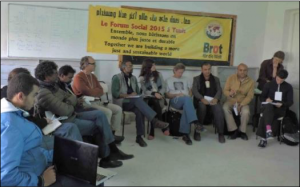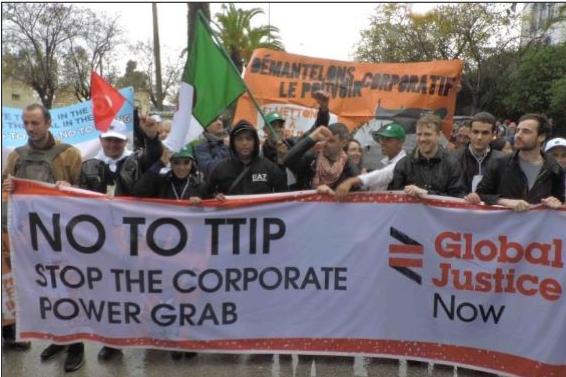First published on 08/29/2015, and last updated on 03/29/2018
By: Ashish Kothari, ICCA Consortium and Kalpavriksh
The World Social Forum 2015 was held in the University of Tunis el Manar from the 24th to the 28th of March. Ashish Kothari, ICCA Consortium Steering Committee member, participated in it and is now offering us a glimpse of it. This is a shortened version of his article, which can be found in its entirety here.
If sheer enthusiasm can deliver ‘another world’, the opening rally of the World Social Forum in Tunis on 24th March held much promise. Thousands of women and men, young and old, vociferous and quiet, a colourful multitude of sloganeering, banner-holding, dancing and singing braved rain and well-below expected temperatures to march from the historic Bab Sadoun to the iconic Bardo Museum. The fact that this rally came just a week after the horrific attack on visitors and workers in this museum, killing 21, was itself highly symbolic. The Forum organisers were quick to not only denounce the attack, but also announce that the Forum would proceed as scheduled as a mark of solidarity with all peace-loving Tunisians, and in celebration of the remarkable revolution wrought by the country’s youth and workers as the first uprising of the Arab Spring. Over the next 4 days, about 70,000 people from over 4,000 movements or organisations are reported to have thronged the Forum in the sprawling University, with participation from every possible cause one could think of. Unfortunately, with hundreds of events taking place over these days, there was no way anyone could have got more than a glimpse of the Forum. I for one was dedicated to two events relating to the search for systemic change, and got no chance to participate elsewhere. But these two events themselves encompassed significant diversity, possibly forming a tiny microcosm of the Forum.

Radical Wellbeing session © A. Kothari
The first, somewhat ambitiously named ‘Towards a World Citizens’ Movement’, brought together about 200 civil society members and movement activists from various countries. Organised by several civil society groups and networks including CIVICUS, Action/2015, GCAP, and CONCORD/DEEEP, this was a continuation of a 2-3 year process of bringing together practitioners and thinkers advocating transformations towards sustainability and equity. It was an interesting convergence (and at times divergence!) of perspectives and experiences from labour activism to spiritual living, from deschoolers and adult education proponents to activist artists, from climate justice activists to poverty eradicators, from degrowth advocates to youth revolutionaries (several from Tunisia!), and many, many more. But there were also conspicuous absentees, such as the global movements of small peasants, fishers and indigenous peoples (e.g. Via Campesina), or of workers and trade unions; with humility several in the the gathering noted that a world citizens’ movement has to be led by such peoples’ movements and not by NGOs, the latter needing to take a facilitative, supportive role.
My second event was much smaller, only about 20 participants. ‘Radical Well-being Alternatives to Development’, organized by Kalpavriksh, Global Diversity Foundation, Centre for Environment and Development, and SADED, made up in quality what it lacked in quantity. Panelists and participants described a range of inspiring examples of communities, civil society or others achieving positive change. Such initiatives, combined with peoples’ resistance to destructive projects and landgrab, are yielding diverse approaches to well-being, some ancient (like buen vivir and sumak kawsay in Latin America, ubuntu in southern Africa, and swaraj in South Asia), some very new (like degrowth in Europe, and radical ecological democracy in South Asia).
I spoke about the struggle for direct democracy by Mendha-Lekha, an adivasi (indigenous) village in central India, which has practised self-rule, conservation of its surrounding forests, sustainable harvesting of forest produce, and the use of resulting revenues for full livelihood, water, and energy security. It has also converted all its private agricultural land to the village commons. In southern India an organization of dalit women farmers, Deccan Development Society, has achieved food sovereignty by organic cultivation of traditional seed diversity, linking this to a public distribution system for the poor and to urban consumers. The women have also become film-makers, run a community radio, and manage a school where children are exposed to both traditional and modern knowledge systems. A global network of peoples and communities are trying to promote such local governance of nature and natural resources, through ICCAs. Additionally to this sole example, we had different approaches on how indigenous peoples and local communities can be actors in change-making. Among others, Leah Temper described the resistance to pipelines and the move to claim sovereignty over traditional territories by First Nations in Canada. This has reinforced the policy of seeking prior and informed consent from communities when their interests are threatened, and the judiciary upholding oral accounts as valid testimony for establishing inalienable rights. She mentioned that the Environmental Justice Atlas coordinated by Autonomous University of Barcelona has been useful in mapping and making accessible accounts of environmental conflicts and resistance movements. Gary Martin pointed to the Moroccan concept of agdal, the collective management of the commons. A manifestation of this is the initiative to provide culturally appropriate education opportunities to girls from traditional communities in dar taliba (girl houses) where they can live and study collectively, with a mix of Amazari (their traditional language) and Arabic, helping them avoid the alienation taking place in mainstream educational institutions. Aseem Shrivastava spoke of the successful mobilization of farmers in western India against attempted land acquisition by one of the country’s most powerful corporations, Reliance.
As a participant of mainly these two events, it was not possible for me to get a sense of whether the rest of the WSF was indeed helping move us towards the promise of ‘another world is possible’.
Moreover, although ICCAs would have had a legitimacy to hold a prominent role in this forum as solutions for change toward well-being and cultural and natural conservation, there were so many representatives of various causes in so many different events that it was difficult to raise these inputs in particular. Networks like the ICCA Consortium perhaps need to invest more in such events that are not directly about ICCAs but form crucial contexts and networking possibilities for ICCAs to flourish. For me, being able to dialogue and interact with a diversity of activists and practitioners and thinkers on the issue of radical well-being alternatives, was itself well worth the long haul to Tunis. Not to mention being able to get a tiny glimpse at how youth can indeed be a revolutionary force.
